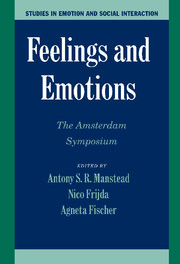Book contents
- Frontmatter
- Contents
- List of Contributors
- 1 Introduction
- PART I THE NATURE OF FEELINGS AND EMOTIONS
- 2 On the Passivity of the Passions
- 3 Emotions and Rationality
- 4 Emotions and Feelings
- 5 The Concept of an Evolved Fear Module and Cognitive Theories of Anxiety
- 6 Deconstructing the Emotions for the Sake of Comparative Research
- 7 From the Emotions of Conversation to the Passions of Fiction
- PART II BASIC PSYCHOLOGICAL PROCESSES IN FEELINGS AND EMOTIONS
- PART III FEELINGS AND EMOTIONS: THE PLACE OF PLEASURE
- PART IV FEELINGS AND EMOTIONS IN THEIR SOCIOCULTURAL CONTEXT
- PART V FEELINGS, EMOTIONS, AND MORALITY
- Subject Index
- Author Index
- Plate section
- References
3 - Emotions and Rationality
Published online by Cambridge University Press: 05 June 2012
- Frontmatter
- Contents
- List of Contributors
- 1 Introduction
- PART I THE NATURE OF FEELINGS AND EMOTIONS
- 2 On the Passivity of the Passions
- 3 Emotions and Rationality
- 4 Emotions and Feelings
- 5 The Concept of an Evolved Fear Module and Cognitive Theories of Anxiety
- 6 Deconstructing the Emotions for the Sake of Comparative Research
- 7 From the Emotions of Conversation to the Passions of Fiction
- PART II BASIC PSYCHOLOGICAL PROCESSES IN FEELINGS AND EMOTIONS
- PART III FEELINGS AND EMOTIONS: THE PLACE OF PLEASURE
- PART IV FEELINGS AND EMOTIONS IN THEIR SOCIOCULTURAL CONTEXT
- PART V FEELINGS, EMOTIONS, AND MORALITY
- Subject Index
- Author Index
- Plate section
- References
Summary
ABSTRACT
The issue of emotion versus rationality is intertwined with the more traditional issue of passion versus reason. This chapter discusses the impact of emotion on impartial reasoning and then considers how instrumental rationality can be affected by emotion, drawing on ancient and modern moralists as well as on recent work on emotion and decision making.
REASON AND RATIONALITY
The relation between emotion and rationality is a tangled one. To untangle it, we first need to distinguish between reason and rationality. From antiquity onward, philosophers and moralists have opposed reason and passion. By “passion,” they mean more or less what modern writers mean by “emotion.” What they mean by “reason” varies across writers and periods. The ancient moralists, of whom I shall take Seneca as my example, had a more restricted idea of reason than what we find, for instance, in James Madison. Both conceptions of reason differ, however, from the modern conception of rationality. The relation between emotion and reason or rationality naturally varies with the way we understand the latter.
Given his vast influence on later writers, we may take Seneca as an exponent of the classical opposition between reason and passion. His treatise On Anger, in particular, has a number of instructive observations. He was well aware, for instance, of the distinction between occurrent emotions and emotional dispositions: “The difference between [anger] and irascibility is evident; it is like the difference between a drunken man and a drunkard, between a frightened man and a coward.
- Type
- Chapter
- Information
- Feelings and EmotionsThe Amsterdam Symposium, pp. 30 - 48Publisher: Cambridge University PressPrint publication year: 2004
References
- 12
- Cited by



